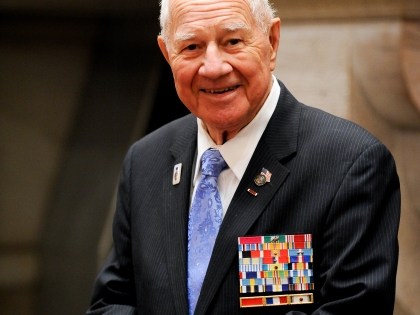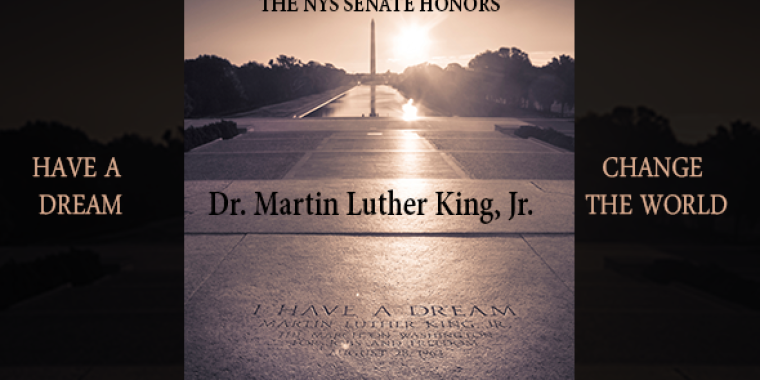
Senator Larkin Issues Proclamation Honoring 60th Anniversary Of V-j Day
William J. Larkin Jr.
September 7, 2005
In honor of the 60th anniversary of the end of World War II, Senator Bill Larkin (R-C, Cornwall-on-Hudson) has issued a formal Senate proclamation.
"It is a privilege to be able to author a statewide proclamation such as this," said Senator Larkin. "I believe it extremely important for our citizens, and especially our young people to observe the ways in which government recognizes such important historic dates and events in our country’s history. I hope that this one in particular will be used as a tool in social studies classrooms and for the public in general to feel a sense of pride in our past and in those who fought so bravely to enable us to live the way we do today."
The proclamation reads as follows:
WHEREAS
, It is the custom of this Legislative Body to commemorate significant events which represent turning points in our unique history and which are indelibly etched in the saga of our great Nation; andWHEREAS, This state commemorates the 60th Anniversary of V-J Day in the United States on September 2, 2005, Japan’s formal surrender to the allies and the end of World War II; and
WHEREAS, By the summer of 1945, the defeat of Japan was a certainty; the Japanese navy and air force were destroyed; the Allied naval blockade of Japan and intensive bombing of Japanese cities had left the country and its economy devastated; and
WHEREAS, At the end of June, the U.S. captured Okinawa, an island from which the Allies could invade the Japanese home islands; the invasion, headed by General Douglas MacArthur and code-named "Operation Olympic," was set for November 1945; and
WHEREAS, The invasion of Japan promised to be the bloodiest seaborne attack of all time, conceivably 10 times as costly as the Normandy invasion in terms of allied casualties; on July 16th, a new option became available when the United States secretly detonated the world’s first atomic bomb in the New Mexico desert; and
WHEREAS, Ten days later, the Allies issued the Potsdam Declaration, demanding the "unconditional surrender of all the Japanese armed forces"; failure to comply would mean "the inevitable and complete destruction of the Japanese armed forces and just as inevitable the utter devastation of the Japanese homeland"; and
WHEREAS, On July 28th, Japanese Prime Minister Kantaro Suzuki responded by telling the press that they were "paying no attention" to the allied ultimatum; U.S. President Harry Truman ordered the attack to proceed, and on August 6th, the B-29 bomber Enola Gay dropped an atomic bomb on the city of Hiroshima, killing an estimated 80,000 people and fatally wounding thousands more; and
WHEREAS, After the Hiroshima attack, a faction of Japan’s supreme war council favored acceptance of the Potsdam Declaration, but the majority resisted unconditional surrender; on August 8th, Japan’s desperate situation took another turn for the worse when the USSR declared war against Japan; the next day, Soviet forces attacked in Manchuria, rapidly overwhelming Japanese positions, and a second U.S. atomic bomb was dropped on the Japanese coastal city of Nagasaki; and
WHEREAS, Just before midnight on August 9th, Japanese Emperor Hirohito convened the supreme war council where he backed a proposal by the Prime Minister which Japan would accept the Potsdam Declaration "with the understanding that said Declaration does not compromise any demand that prejudices the prerogatives of His Majesty as the sovereign ruler"; the council obeyed Hirohito’s acceptance of peace and on August 10th the message was relayed to the United States; and
WHEREAS, Early on August 12th, the United States answered that "the authority of the emperor and the Japanese government to rule the state shall be subject to the Supreme Commander of the Allied Powers"; after two days of further debate, Emperor Hirohito declared that peace was preferable to destruction; he ordered the Japanese government to prepare a text accepting surrender; and
WHEREAS, Emperor Hirohito told his subjects, "we have resolved to pave the way for a grand peace for all the generations to come by enduring the unendurable and suffering what is insufferable"; the United States immediately accepted Japan’s surrender; and
WHEREAS, President Truman appointed MacArthur to head the Allied occupation of Japan as Supreme Commander of the Allied Powers and preside over the surrender; for the site of Japan’s formal surrender, Truman chose the USS Missouri, a battleship that had seen considerable action in the Pacific and was named after Truman’s native state; and
WHEREAS, On September 2nd, just after 9am Tokyo Time, Japanese Foreign Minister Mamoru Shigemitsu signed the formal surrender on behalf of the Japanese government; General Yoshijiro Umezu then signed for the Japanese armed forces; and
WHEREAS, General MacArthur signed on behalf of the United Nations, declaring, "It is my earnest hope and indeed the hope of all mankind that from this solemn occasion a better world shall emerge out of the blood and carnage of the past"; as the ceremony ended, the sun burst through the clouds; the most devastating war in human history was over; now, therefore, be it
RESOLVED, That as a duly elected member of the New York State Senate, I recognize and celebrate the 60th Anniversary of V-J DAY IN THE STATE OF NEW YORK and honor the sacrifices made by our armed services in the defense of their country and the preservation of liberty.
Share this Article or Press Release
Newsroom
Go to Newsroom2015-2016 EXECUTIVE BUDGET PROPOSAL INFORMATION
January 23, 2015
Martin Luther King, Jr. Day January 19, 2015
January 16, 2015

Pine Bush High School Swearing-in Ceremony
January 16, 2015
